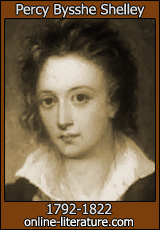 Subscribe for ad free access & additional features for teachers. Authors: 267, Books: 3,607, Poems & Short Stories: 4,435, Forum Members: 71,154, Forum Posts: 1,238,602, Quizzes: 344
Subscribe for ad free access & additional features for teachers. Authors: 267, Books: 3,607, Poems & Short Stories: 4,435, Forum Members: 71,154, Forum Posts: 1,238,602, Quizzes: 344
To Constantia, Singing
[Published by Mrs. Shelley in "Posthumous Poems", 1824. Amongst the
Shelley manuscripts at the Bodleian is a chaotic first draft, from
which Mr. Locock ["Examination", etc., 1903, pages 60-62] has, with
patient ingenuity, disengaged a first and a second stanza consistent
with the metrical scheme of stanzas 3 and 4. The two stanzas thus
recovered are printed here immediately below the poem as edited by Mrs.
Shelley. It need hardly be added that Mr. Locock's restored version
cannot, any more than Mrs. Shelley's obviously imperfect one, be
regarded in the light of a final recension.]
1.Thus to be lost and thus to sink and die,
Perchance were death indeed!--Constantia, turn!
In thy dark eyes a power like light doth lie,
Even though the sounds which were thy voice, which burn
Between thy lips, are laid to sleep; _5
Within thy breath, and on thy hair, like odour, it is yet,
And from thy touch like fire doth leap.
Even while I write, my burning cheeks are wet.
Alas, that the torn heart can bleed, but not forget!2.
A breathless awe, like the swift change _10
Unseen, but felt in youthful slumbers,
Wild, sweet, but uncommunicably strange,
Thou breathest now in fast ascending numbers.
The cope of heaven seems rent and cloven
By the enchantment of thy strain, _15
And on my shoulders wings are woven,
To follow its sublime career
Beyond the mighty moons that wane
Upon the verge of Nature's utmost sphere,
Till the world's shadowy walls are past and disappear. _203.
Her voice is hovering o'er my soul--it lingers
O'ershadowing it with soft and lulling wings,
The blood and life within those snowy fingers
Teach witchcraft to the instrumental strings.
My brain is wild, my breath comes quick-- _25
The blood is listening in my frame,
And thronging shadows, fast and thick,
Fall on my overflowing eyes;
My heart is quivering like a flame;
As morning dew, that in the sunbeam dies, _30
I am dissolved in these consuming ecstasies.4.
I have no life, Constantia, now, but thee,
Whilst, like the world-surrounding air, thy song
Flows on, and fills all things with melody.--
Now is thy voice a tempest swift and strong, _35
On which, like one in trance upborne,
Secure o'er rocks and waves I sweep,
Rejoicing like a cloud of morn.
Now 'tis the breath of summer night,
Which when the starry waters sleep,
Round western isles, with incense-blossoms bright, _40
Lingering, suspends my soul in its voluptuous flight.
STANZAS 1 AND 2.As restored by Mr. C.D. Locock.
1.
Cease, cease--for such wild lessons madmen learn
Thus to be lost, and thus to sink and die
Perchance were death indeed!--Constantia turn
In thy dark eyes a power like light doth lie
Even though the sounds its voice that were _5
Between [thy] lips are laid to sleep:
Within thy breath, and on thy hair
Like odour, it is [lingering] yet
And from thy touch like fire doth leap--
Even while I write, my burning cheeks are wet-- _10
Alas, that the torn heart can bleed but not forget.2.
[A deep and] breathless awe like the swift change
Of dreams unseen but felt in youthful slumbers
Wild sweet yet incommunicably strange
Thou breathest now in fast ascending numbers... _15***
TO CONSTANTIA.
[Dated 1817 by Mrs. Shelley, and printed by her in the "Poetical
Works", 1839, 1st edition. A copy exists amongst the Shelley
manuscripts at the Bodleian. See Mr. C.D. Locock's "Examination", etc.,
1903, page 46.]1.
The rose that drinks the fountain dew
In the pleasant air of noon,
Grows pale and blue with altered hue--
In the gaze of the nightly moon;
For the planet of frost, so cold and bright, _5
Makes it wan with her borrowed light.2.
Such is my heart--roses are fair,
And that at best a withered blossom;
But thy false care did idly wear
Its withered leaves in a faithless bosom; _10
And fed with love, like air and dew,
Its growth--NOTES:
_1 The rose]The red Rose B.
_2 pleasant]fragrant B.
_6 her omitted B.
| Art of Worldly Wisdom Daily In the 1600s, Balthasar Gracian, a jesuit priest wrote 300 aphorisms on living life called "The Art of Worldly Wisdom." Join our newsletter below and read them all, one at a time. |
Sonnet-a-Day Newsletter Shakespeare wrote over 150 sonnets! Join our Sonnet-A-Day Newsletter and read them all, one at a time. |
